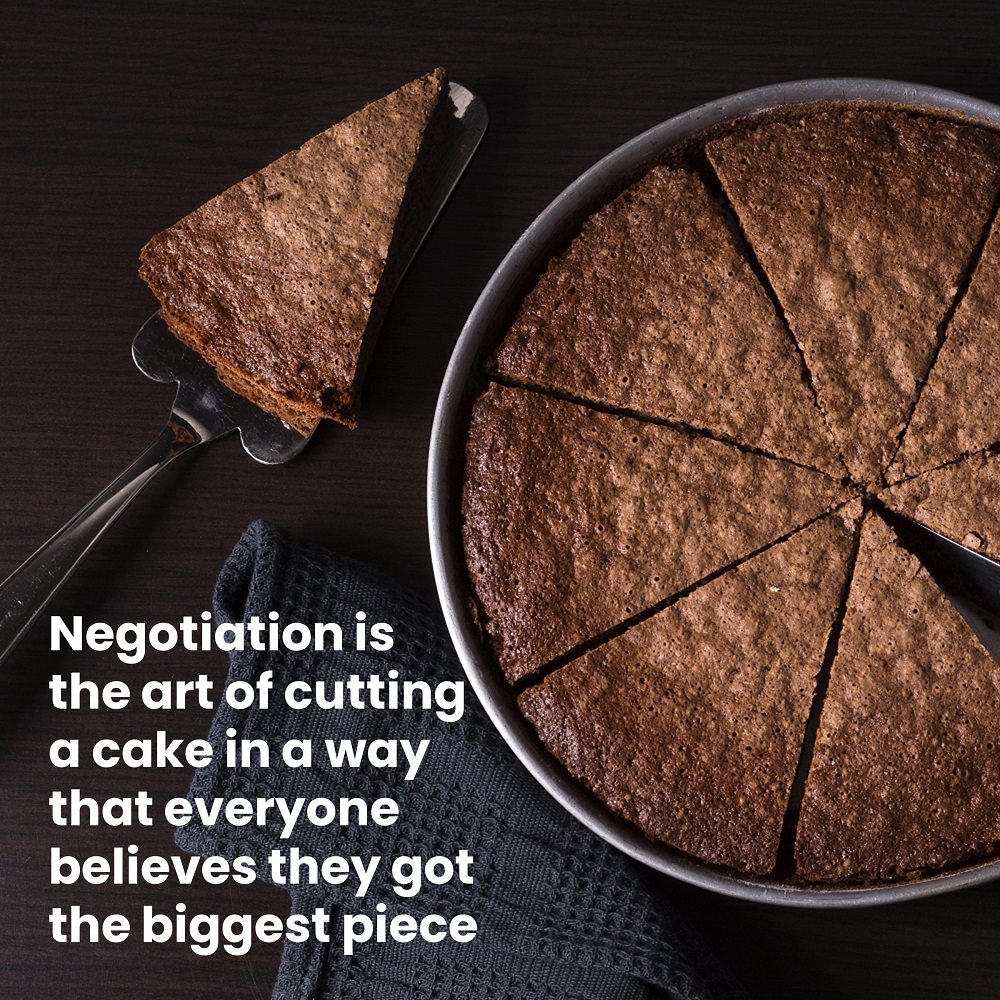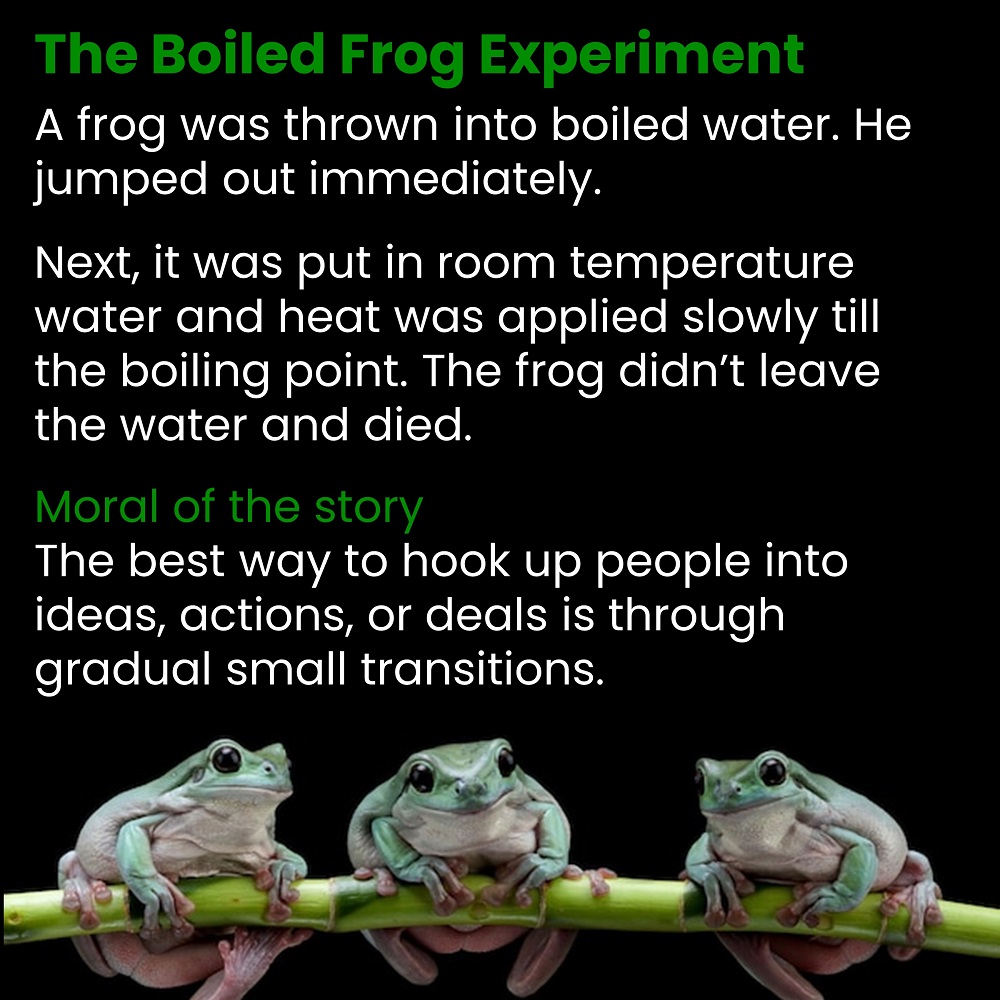30 Killer negotiation tips for buyers, sellers, personal life, or business 🤝

Negotiation is at the heart of our daily lives, both personal and professional. The better we negotiate the more we can get.
Whether you are a professional seller, an average buyer, or a dedicated housewife, there is something for you to gain from these negotiation tips. So without delay, let's begin.

-
1. Shoot High

Always start by asking for more than what you really want.
During the negotiation process expect your demands to be reduced.
If you start with exactly what you want, you will probably get less.
For example: in a job interview if your target salary is $5,000, ask for $7,000.
-
2. Never Say No

Don't be responsible for the "No". Don't be the one to blow out the deal.
Blame your boss, blame the system, blame the government, or your wife.
It is very important to pose as their ally and to show that you are on their side.
Example: trying to sell a property? If the client goes lower than your minimum selling price tell them that you are OK with the price but you have to check with your manager and later say that your manager didn't approve, NOT YOU. It is never you.
-
3. Give Options

It has been scientifically proven that people are more likely to make a decision when there are choices to pick from as opposed to open-ended situations.
Humans like to compare things and weigh the pros and cons of different objects all the time.
You can use this psychological trick to force others into making a decision.
Example: want your children to have vegetables for lunch instead of junk food, ask them to choose between vegetables and something they hate (tuna, for example, my children just hate it).
Giving choices subconsciously distracts the mind from other choices by highlighting two or more choices.
Example: trying to sell a car, whenever the client pauses for a long thought just ask them which color would they prefer or whether they prefer to have a sunroof. Let the decision-making process kick in!.
-
4. The Social Proof

People are more likely to sign up for something when they know that others have done the same. Social proof is one of the strongest emotional signals to convince others of anything.
Be prepared to present data to your prospects and always be honest.
I personally use this trick whenever I want to take my wife to a restaurant of my choice. I always tell her that my friends have gone there and it was a blast!
-
5. Use Numbers

Use numbers and facts to illustrate your points.
As opposed to personal opinions and subjective statements, no one can argue with facts especially when they are properly presented.
Example: trying to lease an apartment, be prepared with the average price of similar properties in the neighborhood as well as historical fluctuations in prices.
This can work for the buyer as much as it works for the seller.
Knowing the market allows you to control the negotiation process and bring the price to the minimum or maximum.
-
6. Use yes/no questions

Focus on yes/no questions to make your point.
Avoid open-ended questions that may lead your prospect to overthink stuff and wander into unnecessary thought processes.
-
7. Establish authority

This is a key step in any successful negotiation.
Establish your knowledge and authority on the subject matter. By doing so your offer will be taken more seriously and others will be reluctant to negotiate knowing that you are an expert on the subject.
-
8. Use Emotional Triggers

Understanding basic human nature can help you steer any negotiation process in your favor.
Humans react to emotional triggers like fear, guilt, trust, reward, punishment, anger, competition, etc.
Not everyone is affected by the same emotions. This will take time to master but the basic idea is to invoke emotions that cause your prospect to react to your offer.
-
9. Establish a common enemy

An old proverb says that the enemy of my enemy is my friend.
That enemy can be anything: the government, the employers, the vendors, etc.
If you can convince your prospect that you are both on the same side, it is more likely that they will rationalize and sympathize with you.
-
10. Use Visuals

People are naturally drawn into images, videos, graphs, and charts.
When you are trying to make a point, use as many illustrations as much as you could.
-
11. Benefits vs Features

Understanding the difference between features and benefits is very important in the negotiation process.
As a negotiator, you need to highlight the benefits of your offer, not the features.
Let us take a simple example. A mobile phone battery can last up to 72 hours. That is a feature.
So what is the benefit?
You don't have to worry about carrying your charger while traveling.
This example can be extended into any situation whether be it in business or in personal life.
Remember that people are interested in solutions to their problems (benefits) not so much in the technical aspects of your product or service (features).
-
12. Don't get overexcited

Never show your excitement about a good offer or a good deal.
It is important that the other person feels that they have gotten the biggest piece of the cake.
This becomes even more important when you expect to renegotiate with the same person again.
-
13. Don't be the first to give a figure

Try as much a possible to not be the side the gives the first figure in the negotiation process.
Negotiation is all about hiding and revealing critical information.
For example, as a candidate in a job interview, you want to avoid giving a salary figure first.
If you give a number that is too low then you might lose money. If you shoot too high, it could cost you the job.
Ask how much the previous person was getting or their budget for the position. If they insist that you give a number, provide a range instead.
-
14. Don't break down your offer

As a seller, don't break down your offer into smaller parts.
Soon enough they will start negotiating the smaller parts which may lead to partial insignificant lost deals.
As a buyer, you should do the exact opposite, break down the offer into smaller parts. Remove what is not necessary, cut down your expenses, and negotiate mini deals.
-
15. Showcase knowledge

As a buyer, you must learn enough about whatever you are negotiating about.
Not only this saves you from being ripped off, but it also shows to the other side that you know what you are talking about and they should not try to fool you or take advantage of your ignorance.
Learn some terminology and buzz keywords before meeting with someone. There are endless guides on the internet on how to buy anything so there are no excuses here.
-
16. Don't look desperate

Even if you are! Desperation puts you in a weak position and you will not be able to negotiate anything from there.
Show confidence and strength at all times. Give the impression that you have other options at your disposal.
-
17. Don't accept the first offer

Don't accept the first offer. There is always something better.
No matter how good the first offer looks, it is not good.
No one starts their negotiation with their bottom line. It is always a couple of magnitudes higher than what they really want.
The first offer is almost always the worst.
-
18. Incremenal commitments (The Boiled Frog Experiment)

In the boiled frog experiment, a frog was thrown into boiling water. He immediately jumped out of the water as expected.
Next, the frog was placed in room temperature water. Heat was applied gradually, raising the temperature little by little till the boiling point.
The interesting part is that when the temperature was raised gradually, the frog did not leave the water even when it boiled, and died of course!
Because the temperature was raised little by little, the frog did not feel the effect.
The moral of the story is that you don't have to hook people immediately to the bigger deal.
If you find too much resistance from your prospects, persuade them into a smaller commitment and build up from there.
-
19. Make a personal connection

You will find it much easier to convince others if you can establish a personal bond with them.
A great tactic used by the best negotiators is to start the process with general personal questions, just make sure you don't invade their privacy or be too pushy.
You can get people to open up to you by revealing personal aspects about yourself.
Once they see that you have opened up to them they will do the same.
-
20. Humor

Speaking of making a personal connection with others, nothing brings two people together better than humor.
Don't be shy to crack up a joke before the negotiation starts to lighten up the mood.
-
21. Reveal secrets

One way to earn someone's trust and make them your friend is to reveal what appears an insider's secret; information that may seem sensitive but really isn't.
Once I was in the bank applying for a credit card and the banker went into great detail to explain how the bank makes a profit from delayed payments or installments.
I very much appreciated the information and immediately felt comfortable listing to what the banker had to offer to me.
Of course, the information was not top-secret but was not common knowledge also, but it did the trick.
-
22. Raise doubts and clear them

Ask and then answer the questions in the head of your prospects before they even ask them.
By addressing their concerns beforehand, you give the impression that your offer is well thought, well crafted, and almost without loopholes.
A very powerful tactic that I personally use all the time when I propose my ideas in meetings.
-
23. Never reveal your bottom line

Not even after the negotiation ends and certainly not during it.
For example, if you accepted a high-salary job offer, don't tell the employer that you were willing to work for less money.
That information has to be kept secret forever.
-
24. The Law of Scarcity

One of the oldest tricks in the book. Tell your prospect that there is a limited quantity of whatever you are trying to sell.
Don't lie!
Humans are obsessed with FOMO: the fear of missing out. They are constantly afraid of missing out on a limited deal.
Additionally, people appreciate exclusivity and may be enticed by the prospect of having something few people can obtain.
-
25. The limited offer

Invoke a sense of urgency by setting an expiry date on your offer.
This will speed up the decision process as your prospects will have to confront FOMO (the fear of missing out).
People hate to be left out and will consider things more seriously when they know that there is limited time to react.
-
26. "The First To" tactic

As opposed to the social proof tactic presented earlier, being the first to do or buy something can have a magical effect on some people.
If you are trying to convince someone, consider enticing them with the prospect of being "The First".
The first to drive a certain car model, the first to own a property in a certain area, etc.
-
27. Use comparisons to other propositions

If you can't make your offer attractive enough, try to compare it with what your competitors are offering.
Of course, it is difficult to come up with an offer that beats every other offer out there that's why you need to focus on the areas that distinguish you and ignore or avoid the points that are not in your favor.
-
28. Refunds

Refund is the best selling tactic on the internet and can work equally well in other mediums as well.
The interesting fact about refunds is that 75% of unsatisfied customers don't ask for them.
So if you are selling a great product then there is nothing to worry about and if your product sucks then your losses will be minimal because not many people request for refunds.
-
29. The Free Trail

Most people eventually commit to the product or service once the trial ends.
A friend of mine has convinced his customers to try a fridge for one month for free with the option to return it if it was not good enough or buy it after the trial period ends.
None of his customers ever returned the fridge! Why would they? Even if the fridge was faulty, it wouldn't cause any issues in the first month of its usage.
-
30. Offer side deals

More often than not, side offers and incentives can tip the deal into someone's side.
Car dealers do this all the time. They offer free insurance, free registration, and other benefits to distract the client and persuade them.
Always look for extra benefits that don't cost you much to entice the other party.


























